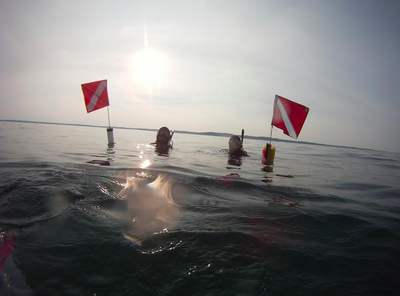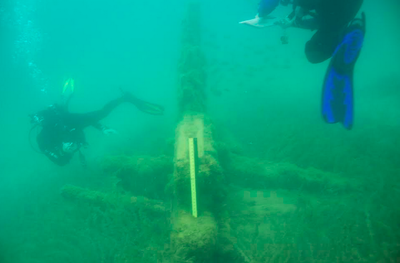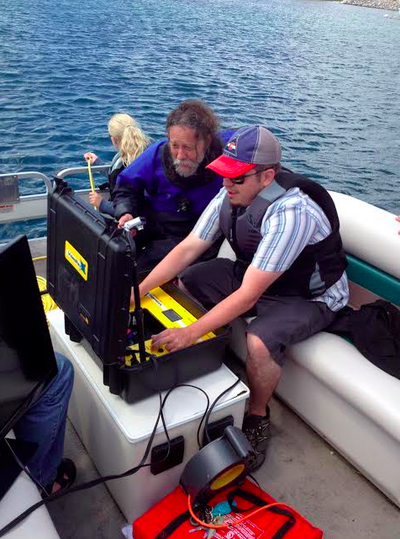*This review was written by Ryan, a Chicago resident and postgrad (BA History, MA International Education). He attended the field school to gain experience in underwater archaeology before applying to graduate school.
FIELD SCHOOL & WEBSITE: Nautical Archaeological Society International Field School at Northwestern Michigan College
OTHER LINKS: Check out a video from the 2014 field school, or their Facebook page.
LOCATION: Northwestern Michigan College, Traverse City, Michigan
AFFILIATIONS: Nautical Archaeological Society, Northwestern Michigan College
CURRENT PROJECT: Participants will assist with an archaeological survey of the Northport wreck, located in 4-8 meters of water in Lake Michigan. The survey will document the nature, extent, history, and condition of the site. The project is appropriate for both novice divers and snorkelers.
STAFF: Staff includes instructors from Northwestern Michigan College, Grand Valley State University, Michigan Tech, the Nautilus Marine Group, and Nautical Archaeological Society tutors.
LENGTH & DATES: July 12th - 26th, 2015. Week 1 (7/12 - 7/18) includes basic courses, and Week 2 (7/20 - 7/27) includes advanced courses.
COST: Accommodation in the Northwestern Michigan College dorms costs $50/night. The Week 1 basic course package is $1,299, and the Week 2 advanced course package is $1,399. Alternatively, you can sign up for individual courses. Meals are not included.
CREDIT AVAILABLE: Both the NAS Part 1 and NAS Part 2 courses qualify for credit at Northwestern Michigan College. Credits transfer to most major universities.
APPLICATION PROCESS: The course booking form and payment can be submitted as described here.
Tell us about your field school experience.
I had an outstanding experience attending the 2014 field school. We began with classroom sessions as part of the NAS part 1 certificate, but quickly moved to NAS part 2 and 3 practical methodology. Within a few days our team of students was putting into practice what we had learned, surveying a project site under the direction of NAS tutors and NMC staff. Traverse City was a remarkable place for underwater archaeology, with a fascinating nautical history and numerous sites both underwater and ashore. I look forward to attending the 2015 school and taking more NAS 3 courses this coming year.
What skills did you learn?
Students of this program learn a variety of skills including: preparing and implementing project proposals, archaeological diving, foreshore and underwater direct survey, using a Total Station for survey, working with underwater ROV’s and sector scan sonar, and recording and preparing site plans using Site Recorder software.
What are the pros and cons of the field school? Would you recommend it?
It was an amazing experience and I would highly recommend this field school to students and others interested in underwater archaeology. What sets this school apart is the opportunity for students (after receiving their NAS I certification) to plan and undertake an individual or team project and write up a survey report. This is a requirement for NAS 2 certification. Although students have access to the direction of NAS tutors, it is up to them to propose, organize, research, survey and write up a site. This is learning by ‘doing’ and is really exciting; not just during the survey dives, but also since through your report, you are actively contributing to a better understanding of local sites.
Another pro is that classes are offered during the field school on different topics relating to underwater archaeology. I attended courses ranging from flint knapping to shipbuilding. Other courses offered included a course on document research (invaluable if you are going to be researching ships and Great Lakes history), ROV construction, and a course on the region’s Native American archaeology. These can all be applied to NAS 3 credits.
Other pros:
The only con I can think of is that Michigan law is such that no excavation of underwater sites in the Great Lakes waters is possible, so the field school is limited to survey.
Anything else you think readers should know about this field school?
I honestly can’t say enough good things about the field school last summer. It was very professional, completely engaging and a totally hands-on experience to underwater archaeology. Grand Traverse Bay is an amazing area with a wealth of underwater heritage (plus lots of good eats after a long day diving on-site). You meet a lot of great people in the field school and the instructors are very supportive; plus, you get in touch with a larger community of underwater archaeologists. And the combination of international NAS certification, course credit and self-directed project work really makes it stand out.
FIELD SCHOOL & WEBSITE: Nautical Archaeological Society International Field School at Northwestern Michigan College
OTHER LINKS: Check out a video from the 2014 field school, or their Facebook page.
LOCATION: Northwestern Michigan College, Traverse City, Michigan
AFFILIATIONS: Nautical Archaeological Society, Northwestern Michigan College
CURRENT PROJECT: Participants will assist with an archaeological survey of the Northport wreck, located in 4-8 meters of water in Lake Michigan. The survey will document the nature, extent, history, and condition of the site. The project is appropriate for both novice divers and snorkelers.
STAFF: Staff includes instructors from Northwestern Michigan College, Grand Valley State University, Michigan Tech, the Nautilus Marine Group, and Nautical Archaeological Society tutors.
LENGTH & DATES: July 12th - 26th, 2015. Week 1 (7/12 - 7/18) includes basic courses, and Week 2 (7/20 - 7/27) includes advanced courses.
COST: Accommodation in the Northwestern Michigan College dorms costs $50/night. The Week 1 basic course package is $1,299, and the Week 2 advanced course package is $1,399. Alternatively, you can sign up for individual courses. Meals are not included.
CREDIT AVAILABLE: Both the NAS Part 1 and NAS Part 2 courses qualify for credit at Northwestern Michigan College. Credits transfer to most major universities.
APPLICATION PROCESS: The course booking form and payment can be submitted as described here.
Tell us about your field school experience.
I had an outstanding experience attending the 2014 field school. We began with classroom sessions as part of the NAS part 1 certificate, but quickly moved to NAS part 2 and 3 practical methodology. Within a few days our team of students was putting into practice what we had learned, surveying a project site under the direction of NAS tutors and NMC staff. Traverse City was a remarkable place for underwater archaeology, with a fascinating nautical history and numerous sites both underwater and ashore. I look forward to attending the 2015 school and taking more NAS 3 courses this coming year.
What skills did you learn?
Students of this program learn a variety of skills including: preparing and implementing project proposals, archaeological diving, foreshore and underwater direct survey, using a Total Station for survey, working with underwater ROV’s and sector scan sonar, and recording and preparing site plans using Site Recorder software.
What are the pros and cons of the field school? Would you recommend it?
It was an amazing experience and I would highly recommend this field school to students and others interested in underwater archaeology. What sets this school apart is the opportunity for students (after receiving their NAS I certification) to plan and undertake an individual or team project and write up a survey report. This is a requirement for NAS 2 certification. Although students have access to the direction of NAS tutors, it is up to them to propose, organize, research, survey and write up a site. This is learning by ‘doing’ and is really exciting; not just during the survey dives, but also since through your report, you are actively contributing to a better understanding of local sites.
Another pro is that classes are offered during the field school on different topics relating to underwater archaeology. I attended courses ranging from flint knapping to shipbuilding. Other courses offered included a course on document research (invaluable if you are going to be researching ships and Great Lakes history), ROV construction, and a course on the region’s Native American archaeology. These can all be applied to NAS 3 credits.
Other pros:
- All the instructors are extremely qualified; they are professionals, professors or experts in their field.
- Not all participants need to dive, as there are opportunities for foreshore and land site surveys.
- Credits are available through NMC, so students can combine getting NAS certified with course credit.
- The field school teaches skills that can be used immediately and prepares participants for organizing and implementing their own projects outside the field school.
The only con I can think of is that Michigan law is such that no excavation of underwater sites in the Great Lakes waters is possible, so the field school is limited to survey.
Anything else you think readers should know about this field school?
I honestly can’t say enough good things about the field school last summer. It was very professional, completely engaging and a totally hands-on experience to underwater archaeology. Grand Traverse Bay is an amazing area with a wealth of underwater heritage (plus lots of good eats after a long day diving on-site). You meet a lot of great people in the field school and the instructors are very supportive; plus, you get in touch with a larger community of underwater archaeologists. And the combination of international NAS certification, course credit and self-directed project work really makes it stand out.



